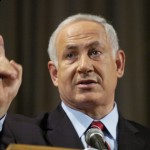Friday
Mar262010
Israel-US Analysis: After Washington, What Will Netanyahu Do?
 Friday, March 26, 2010 at 14:29
Friday, March 26, 2010 at 14:29  It's not only the high-level US-Israel meetings in Washington that were divisive. The follow-up statements also clash.
It's not only the high-level US-Israel meetings in Washington that were divisive. The follow-up statements also clash.On Thursday, President Obama’s spokesman Robert Gibbs said: “I think we’re making progress on important issues. But nothing more on substance to report than that.”
Israel: So What is This Government Crisis? (Carlstrom)
In contrast, as Prime Minister Benjamin Netanyahu returned to Israel, his spokesman Nir Hefez told Army Radio that Netanyahu had reached a “list of understandings” on policy toward Palestinians, albeit "with additional points still in disagreement between the sides” in Washington. Hafez added:
There are several steps that the Americans would like to see Israel take in order to restart the peace process. We returned from the US with the understanding that on one hand, the construction policy in Jerusalem will remain unchanged, and on the other hand, Israel is prepared to make gestures in order to resume the peace process.
Despite the fact that Netanyahu gave no concessions on Jerusalem, Obama's timeline seems to be explicit: Washington wants tangible change to bring to the Arab League meeting on Saturday.
What are these "demands"? According to The Jerusalem Post, the Obama Administration asked Israel to commit to some limits on building in east Jerusalem; to show a willingness to deal with the so-called "core" issues of borders, refugees, and Jerusalem in the indirect talks; and to agree to a number of confidence-building measures, including the release of hundreds of Fatah prisoners. It is also reported that the administration asked for a commitment to extend the moratorium on housing starts in the West Bank settlements beyond the 10 months originally declared by Netanyahu.
In response, the Israeli Prime Minister asked for extra time to convene his seven-member inner cabinet ministers on Friday to discuss the US demands. According to Israeli senior officials, Netanyahu did not commit himself to a prisoner release and was bringing the matter to the security establishment in Israel for their consideration.
Netanyahu said that he is supporting construction in Jerusalem on his own accord and not because coalition partners are pressuring him to do so: "I do not need coalition partners to pressure me into continuing to build in Jerusalem. I, myself, plan to continue building in Jerusalem as all previous prime ministers did before me."
Sources close to the Prime Minister say that Netanyahu will intensify efforts to draw Kadima members of the Knesset into his Government. In response to this, senior sources in Kadima told Haaretz:
If Benjamin Netanyahu wants us in the coalition, he needs to alter its makeup, break up his extremist government, rebuild it with us. We will not enter a right-wing government and we will not join without an orderly political [peace negotiations] program.
So, what is Netanyahu's position now?
It appears that the Prime Minister is trying to convince his coalition members of additional "concessions" --- extending the moratorium on West Bank construction, delaying some settlements in East Jerusalem until the end of proximity talks, releasing hundreds of Fatah members, and transferring control of some areas in the West Bank to the Palestinian Authority --- in return for continuing other settlement constructions in East Jerusalem.
If Netanyahu succeeds, then his government will be able to claim "no more concessions" to Palestinian demands. If not, then he will have exhausted all efforts with his coalition members, setting the conditions to blame his partners and accepting Kadima's demand for a reconfigured Government.
But for all these calculations, Netanyahu still faces a cold reality: the man who couldn't get an answer in Washington, needs an answer in Israel from someone who will work with him.
